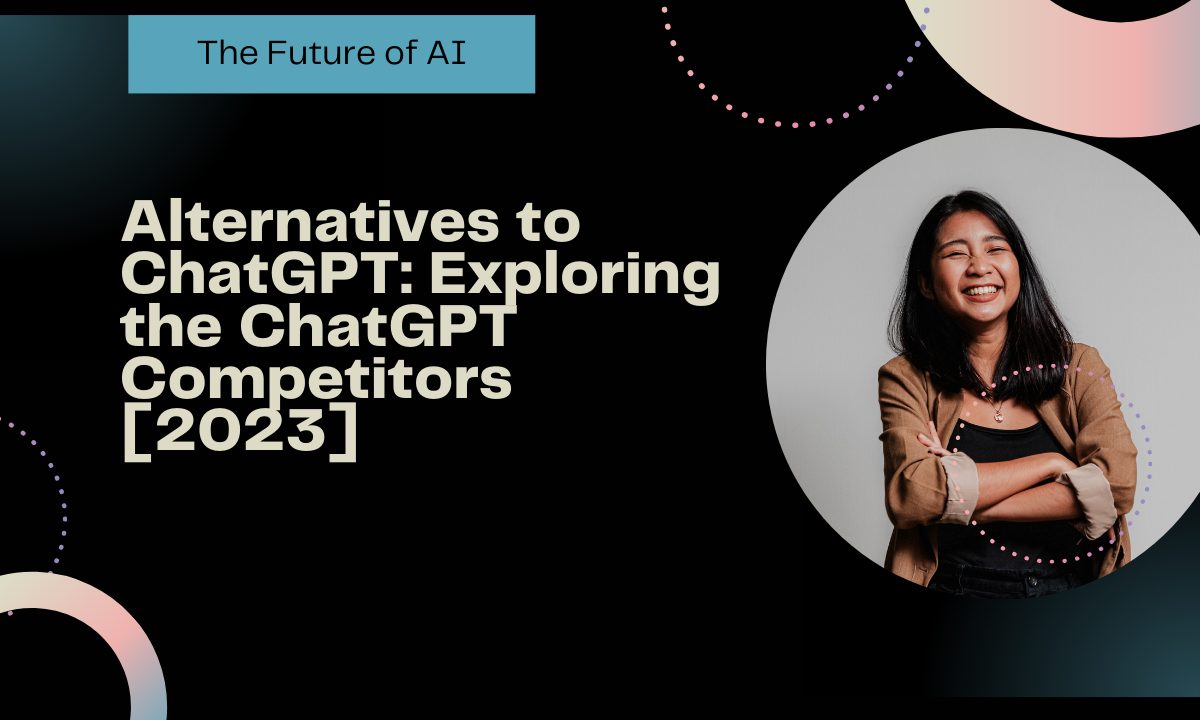ChatGPT has taken the world by storm and brought conversational AI into the mainstream. However, it’s not the only game in town. A range of competitors aim to push the boundaries of natural language AI even further.
In this post, we’ll highlight emerging alternatives to ChatGPT that offer their own unique capabilities and approaches in 2023.
Why Consider ChatGPT Alternatives?
While innovative, ChatGPT has some key limitations users should keep in mind:
- Occasional inaccurate or biased responses
- Limited knowledge of recent events
- Can be steered into harmful or unethical content
- Lack of personalization to user preferences
- Privacy concerns around data collection
Alternative services strive to overcome these weaknesses in different ways to provide distinct user benefits.
Leading ChatGPT Competitors and Alternatives
Here are some of the most prominent AI services aiming to best ChatGPT in certain domains:
Anthropic – Claude
Claude focuses on safety through “Constitutional AI” – adhering to human values like honesty, care, and transparency. Early reviews praise Claude for refusing harmful requests, admitting knowledge gaps, and maintaining coherent conversations.
Alphabet – Sparrow
Google’s parent company Alphabet offers Sparrow, a more factual and logical conversationalist. Sparrow aims to avoid ChatGPT’s pitfalls of confidence despite inaccuracies. It’s currently restricted but shows promise.
Microsoft – Sydney
Sydney comes integrated into Microsoft’s Bing search engine, allowing for verified, referenced responses by tapping into search data. It exhibits more restraint than ChatGPT in making unsubstantiated claims.
Anthropic – Phil
A subclass of Claude, Phil is designed specifically as a helpful philosopher. It engages thoughtfully on ethics, reasoning through conversations, and unpacking complex concepts.
Stability AI – Stable Diffusion
This AI startup produces Stable Diffusion for state-of-the-art text and image generation. Fine-tuning it on dialogue could yield capable conversational models.
Facebook – LLaMA
Meta’s LLaMA framework demonstrates sophisticated multilingual abilities, translation skills, and coding know-how that surpass ChatGPT’s capabilities in those domains.
Cohere – Cohere Open-Ended Classifier
Specializing in classifying conversation topics, this AI API could enable smart topic steering and personalization beyond ChatGPT’s generic responses.
Kognitos – Conversation Simulator
Focused on highly engaging dialogue, this chatbot delivers dynamic conversations that avoid the stiff, mechanical exchanges ChatGPT can produce.
Chroma – Chroma Chat
Part of Anthropic’s suite alongside Claude, Chroma allows training conversational AI on custom datasets to capture specific tone, knowledge and personality.
Evaluating ChatGPT Alternatives

When assessing alternatives in 2023, here are key considerations:
- Capabilities – Does it exhibit clear strengths in areas like accuracy, creativity or personalized dialogue?
- Safety – What precautions does it take against toxic, biased or dangerous content?
- Access – Is it widely available yet, or still restricted? Is there a waitlist?
- Integration – How easy is it to integrate into apps and products via API and embeddings?
- Pricing – Does it offer flexible plans if taking conversations to scale?
- Data Privacy – How transparent is its approach to data collection, storage and use?
Ideally, alternatives will outperform ChatGPT in defined domains while upholding rigorous ethics standards.
The Future of Conversational AI
We should expect continued rapid evolution of chatbots:
- More specialized domain knowledge and expertise
- Integration of external data sources for verified responses
- Configurable bot personalities and tones
- User customization via fine-tuning on private data
- Multi-modal conversations encompassing images, video and audio
- Improved context tracking and personalization
Responsible innovation practices will be critical as capabilities advance. But the next generation of chatbots shows promise to transform how we access and use information.
Conclusion
While revolutionary, ChatGPT is far from the final word in conversational AI. A wave of alternatives address its shortcomings with innovative approaches.
Evaluating new options based on capabilities, ethics and access will help users determine the best services for their needs as the technology matures in 2023.
One thing is certain – with so much active development, the future looks bright for even more powerful and nuanced chatbots that responsibly augment human potential.
The democratization of conversational AI is just getting started. Prudent adoption paired with constructive feedback will drive steady progress toward truly useful and trustworthy chatbot partners.
FAQS
What are the biggest risks of ChatGPT alternatives?
The risks are similar to any powerful AI system – potential biases, toxicity, privacy concerns, and malicious misuse. Rigorous testing and responsible development is critical.
Will any ChatGPT alternative be completely open source?
So far none of the major competitors are fully open source. Some like Anthropic have open sourced certain components, but the full models remain proprietary.
How good is the accuracy of ChatGPT competitors today?
Most are still in early stages, but initial evaluations show they outperform ChatGPT in certain domains while struggling in others. Accuracy remains imperfect and varies across services.
When will ChatGPT alternatives be widely accessible?
Timeline is uncertain, but likely 6-12 months for most to expand from limited testing to public access based on developer statements. Depends on safety validation processes.
Can these chatbots completely replace Google/web search?
Not yet – external knowledge integration is still limited, so traditional search excels for fact-checking. But some alternatives aim to combine conversational AI with search.
Should I pay for multiple chatbot services?
Likely not necessary initially – try free tiers first to determine which service best suits your needs before subscribing. As capabilities advance, combining may offer benefits.
How will these services impact jobs and the economy?
The effects will be mixed – some roles made more efficient while others potentially disrupted. But responsible regulation and training can maximize benefits and mitigate risks.
What are the privacy best practices I should follow?
Be selective in sharing personal information, study privacy policies, limit stored conversation history, ask clarifying questions on data practices, and provide transparent consent.

